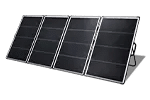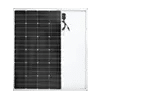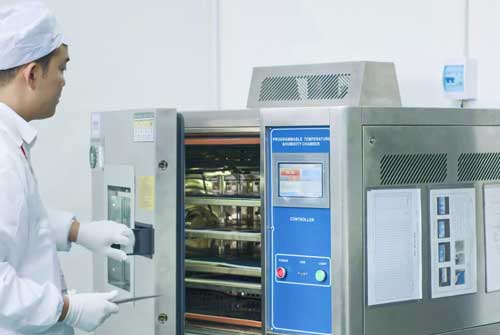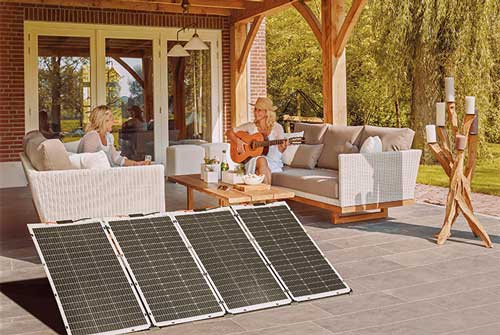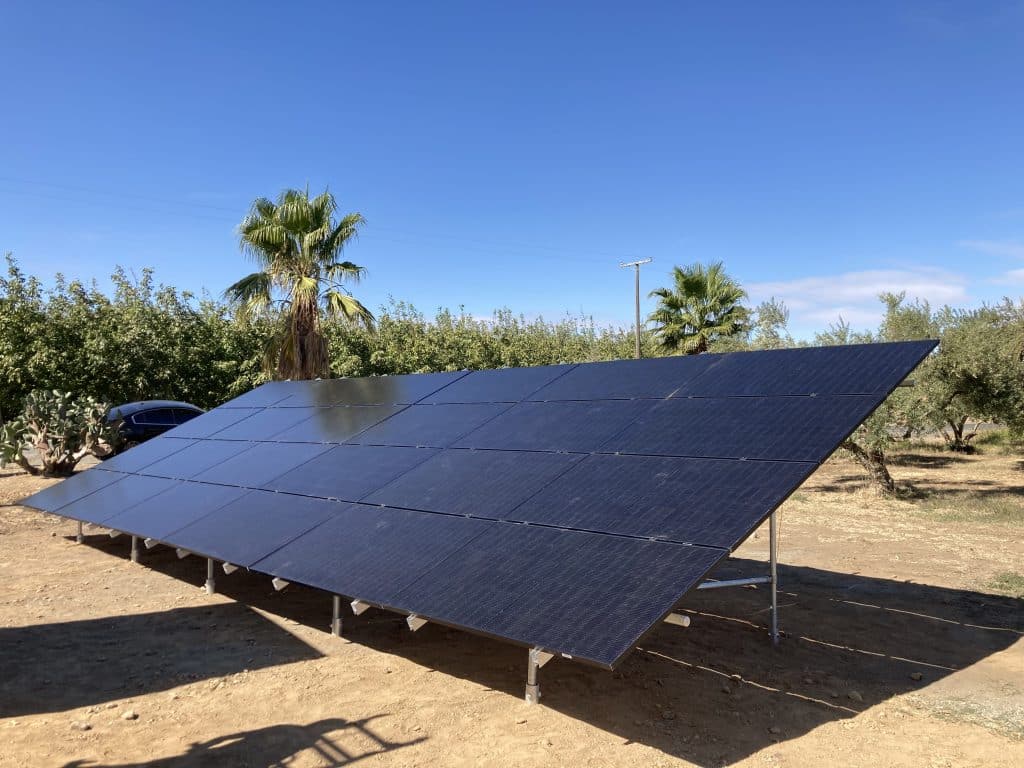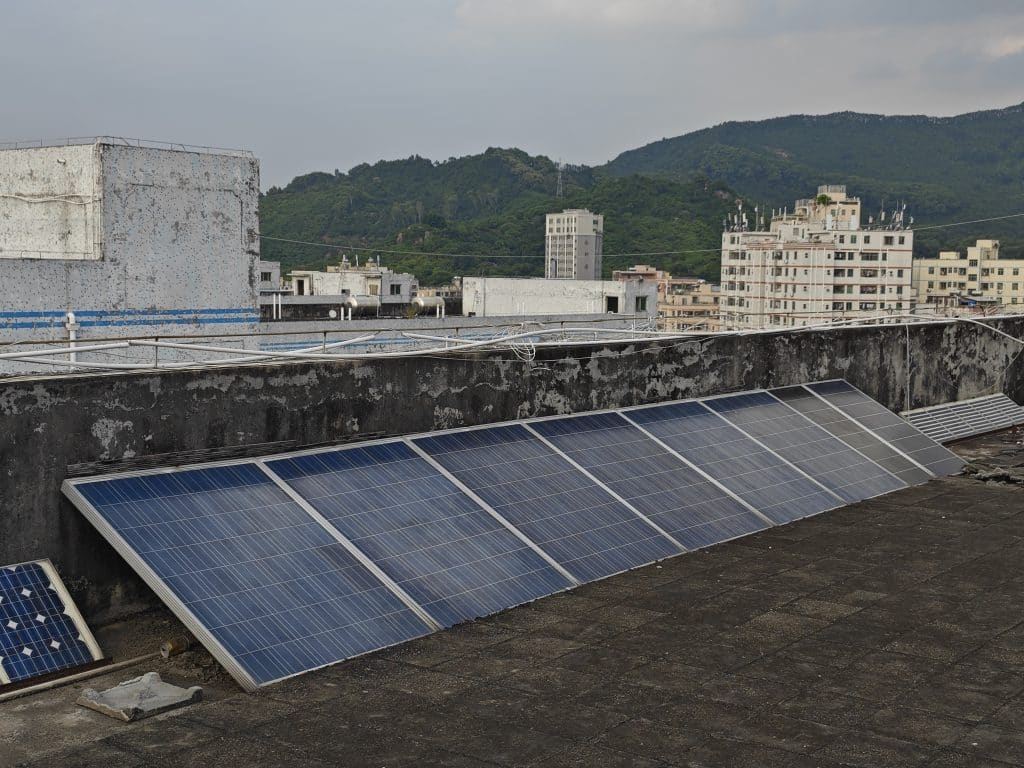The ground-mounted solar panels provide an additional option for harnessing solar energy to power homes. These panels can be installed through pole-mounted or standard installations. When homeowners consider adding a solar system, the first thought that comes to mind is often rooftop panels. However, ground-mounted solar panels (similar to what you see in solar farms and solar garages) are equally effective. Sungod offers excellent ground-mounted solar panels designed to harness clean and renewable solar energy. These panels, equipped with adjustable mounts, utilize alignment technology to achieve optimal positioning for direct sunlight exposure. With an outstanding conversion rate of up to 23%, your devices and appliances can efficiently charge, maximizing the utilization of solar energy.
What are ground-mounted solar panels?
Ground-mounted solar panels are similar to rooftop solar panels, with the key difference being that ground-mounted solar panels are installed on the ground, utilizing either standard or pole-mounted installations. Some ground-mounted solar panel systems can track the sun’s movement to capture the maximum sunlight throughout the day.
Ground-mounted solar panels are a method of solar system installation in which solar panels are installed on the ground rather than on the rooftops or other structures of buildings. This installation typically involves mounting solar panels on supports or frames, allowing them to be tilted or positioned for optimal solar radiation exposure. Ground-mounted solar panels are often used in the following scenarios:
Large Land Availability: Ground-mounted installations typically require more land area, making them suitable for locations with ample land availability, such as farmlands, open fields, industrial areas, etc.
Unobstructed Sunlight: In comparison to rooftop installations, ground-mounted installations can more easily avoid obstructions from buildings, trees, or other obstacles, ensuring more sunlight exposure.
Adjustable Installation Angles: Ground-mounted systems often feature adjustable mounts, allowing the angle of the solar panels to be altered based on the season or the sun’s position, maximizing energy collection efficiency.
Ease of Maintenance and Repairs: Solar panels on the ground are more accessible, making maintenance and repair work more convenient.
Ground-mounted solar panels are a common choice, especially for projects that require significant solar energy generation, such as solar farms or commercial solar power projects. This installation method helps harness solar resources, reduce energy costs, and minimize environmental impact.
Ground-mounted solar panels are often your best choice.
Ground-mounted solar panels can be made of glass panels or flexible solar panels, depending on your requirements. As the name suggests, a ground-mounted solar panel system is a system where solar panels are installed on the ground. While rooftop solar panels are the most common choice for homeowners, there are many reasons to consider a ground-mounted solar panel system.
Advantages of Ground-Mounted Solar Panels
Convenient and Efficient: Ground-mounted solar panels typically have a higher cost per watt compared to rooftop solar panels, but they are often more efficient. The characteristics of a rooftop can limit the use of rooftop solar panel arrays. If your roof’s angle is incorrect, not facing south, or has obstructions like chimneys or skylights, the efficiency of your solar panel array will decrease. On the other hand, ground-mounted solar panels can be installed in the most suitable conditions. If your roof isn’t suitable for solar, they are a good alternative.
Meeting High Energy Demands: Powering your home with upgrades like heat pumps, electric cars, and other enhancements can reduce your carbon footprint and energy costs, but it will increase your electricity consumption. If your home uses a significant amount of electricity, your roof may need to be larger to accommodate a solar panel system to meet your energy needs. In contrast, you can adjust the size of a ground-mounted solar system to match your electricity consumption, without the space limitations of a rooftop system.
Ground-mounted solar panel systems offer a flexible solution that can be customized to your specific needs and conditions. This provides you with more options to maximize solar resources, reduce energy costs, and lessen your environmental impact.
What are the best ground-mounted solar panels?
Ground-mounted solar panels come in different types and configurations. Here are some of the most worthwhile investments in ground-mounted solar panels:
Rigid Solar Panels
– For long-term or permanent installations, rigid solar panels are a good consideration. They are made with monocrystalline solar cells, reinforced with aluminum frames, and covered with sturdy tempered glass.
– Rigid solar panels are weather-resistant and typically produce less heat due to the gap between the cells and the surface.
Bifacial Solar Panels
– Bifacial solar panels have two surfaces that can capture sunlight and generate electricity. These panels are often designed with a transparent or glass back, allowing light to pass through the back of the panel.
– This unique design enables bifacial solar panels to harness energy from direct sunlight and reflected light, increasing their energy production potential.
Flexible Solar Panels
– Flexible solar panels come into play when you need to install solar panels on uneven surfaces. This is possible because the panels can flex and adapt to different shapes.
– Due to their slim profile, flexible solar panels are easy to transport, install, and store. Common applications include RVs and boats
Portable Solar Panels
– As the name suggests, portable solar panels are smaller in size and suitable for low-power devices. They are often used to charge mobile power sources and similar equipment.
– Sungold’s portable solar panels are a good choice as they are lightweight yet very sturdy. Additionally, they are made from robust polymer and canvas.
High-Wattage Solar Panels
– High-wattage solar panels are highly efficient and don’t occupy as much space as other solar panels. They have a compact structure and are easier to install.
– Furthermore, these panels are cost-effective and require less space. They are best suited for solar power plants, homes, and commercial facilities, ultimately generating renewable energy and reducing electricity bills and carbon footprint.
Different types of ground-mounted solar panels.
Ground-mounted solar panels can be installed in two ways: standard installation or pole-mounted installation.
Standard Ground-Mounted Solar Systems
Standard ground-mounted solar panel systems are similar to rooftop solar installations, with panels mounted on metal frames. The top of a standard ground-mounted solar system is slightly tilted, and the frames are sometimes made of steel. Occasionally, the frames can be adjusted to follow the occasional variations of the sun for optimal sunlight absorption.
One key selling point of this system is its affordability. Standard ground-mounted solar panel systems are cheaper and easier to install and maintain than pole-mounted systems.
Pole-Mounted Solar Systems:
Pole-mounted solar systems involve a single mast or pole deeply anchored in the ground with a concrete foundation, capable of accommodating various solar panels, with some brands accommodating up to 24 panels. This system elevates the solar panels higher off the ground than standard ground-mounted solar systems.
A significant advantage of pole-mounted systems is the ability to install solar trackers, which can be game-changers for solar panels. With solar tracking capabilities, pole-mounted systems can maximize sunlight absorption.
Pole-mounted solar systems support multiple solar panels on a single pole and lift them higher off the ground than standard ground-mounted installations. Pole-mounted systems often utilize solar tracking systems, which automatically tilt the solar panels to capture the optimal amount of sunlight.
Solar Tracking systems can increase the output of solar panels by 25% or more. When adding a tracker to a ground-mounted solar panel array, you can choose between a single-axis or dual-axis system. A single-axis tracking system moves your solar panels to follow the sun’s movement across the sky, while a dual-axis tracking system adjusts for seasonal changes in the sun’s position.
It’s worth noting that pole-mounted solar panel installations are more expensive, require more maintenance, and consume electricity to operate the tracking system, which may utilize the absorbed extra energy.
Ground-mounted solar panel systems have many advantages.
Even if you are a good candidate for a rooftop solar system, choosing a ground-mounted solar panel system has many benefits:
– Ground-mounted solar panel systems can be installed on open land without the need for roof penetrations. Furthermore, ground-mounted solar panels can be set at the ideal angle to maximize energy production, while rooftop solar arrays are limited by the roof’s slope and orientation. Therefore, compared to similar-sized rooftop systems, ground-mounted solar panels can generate more electricity (thus saving you more on your electricity bills).
– Ground-mounted solar panels are easy to clean and maintain. If you live in an area with heavy snowfall in the winter, quickly clearing off snow can be very convenient.
– Despite the relatively higher cost, the cost of a standard ground-mounted solar system is comparable to that of a rooftop solar system. Systems with tracking capabilities may involve additional upfront costs, but the increased electricity generation they provide enhances the cost-effectiveness of your installation.
These advantages make ground-mounted solar panels an attractive choice, especially for those looking to maximize solar resources and energy benefits.
Ground-mounted solar panels have their pros and cons
If you are considering installing a ground-mounted solar system beyond the rooftop setup, understanding the advantages and disadvantages of these systems will influence your decision. Ultimately, your choice will depend on your needs and the parameters within which you and your solar provider must work.
Advantages of Ground-Mounted Solar:
– Maximum Sunlight Absorption: Ground-mounted solar panels have the ability to absorb maximum sunlight. Even if your rooftop orientation is less than ideal, you can choose the direction for ground installation to increase energy production. Additionally, ground-mounted systems often exhibit higher operational efficiency due to increased airflow beneath the panels, helping maintain cooler panel temperatures. Finally, if system maintenance is required, technicians can access ground-mounted systems more easily, often reducing potential labor costs.
Disadvantages of Ground-Mounted Solar:
– Land Requirement: Ground-mounted solar systems are not suitable for everyone. In comparison to rooftop systems, ground installations may require the use of valuable land. If your land is used for gardening, recreation, or agriculture, sacrificing land can be challenging (although in certain cases, you can effectively combine agriculture and ground-mounted systems through agrivoltaics). Furthermore, stand-alone solar panels are more susceptible to the risk of damage from wildlife or human interference. Finally, as mentioned earlier, due to the need for additional installation equipment and foundation work, ground-mounted solar systems tend to be more expensive.
These advantages and disadvantages make ground-mounted solar panels an attractive choice, especially for those looking to maximize solar resources and gain greater energy efficiency.
FAQ
Q: Can You DIY Install Ground-Mounted Solar Panels?
A: Yes, you can install ground-mounted solar panels yourself. This is typically considered easier than installing rooftop solar panels due to fewer safety hazards. However, you might still require professional assistance to run wiring or build new structures.
Q: Are There Incentives for Installing Ground-Mounted Solar Panels?
A: Ground-mounted solar panels are eligible for the Federal Solar Investment Tax Credit (ITC), which offers a 26% tax credit for homeowners who install solar panels in 2022. This rate will decrease to 22% by 2023. Some states provide additional tax credits and incentives.
Q: Can You Go Off-Grid with Ground-Mounted Solar Panels?
A; Yes, you can use ground-mounted solar panels if you’re not connected to the grid. Like any off-grid solar panels, you will need a battery to store electricity.
Q: Are Ground-Mounted Solar Panels Better
A: Yes, ground-mounted solar panels typically offer higher efficiency than rooftop installations. They can be positioned with the optimal tilt and orientation to maximize sunlight capture. Additionally, ground installations are easier to access and maintain, reducing costs associated with maintenance and cleaning. Portable power stations can also be paired with ground-mounted solar panels to provide reliable, convenient power for living or outdoor activities



